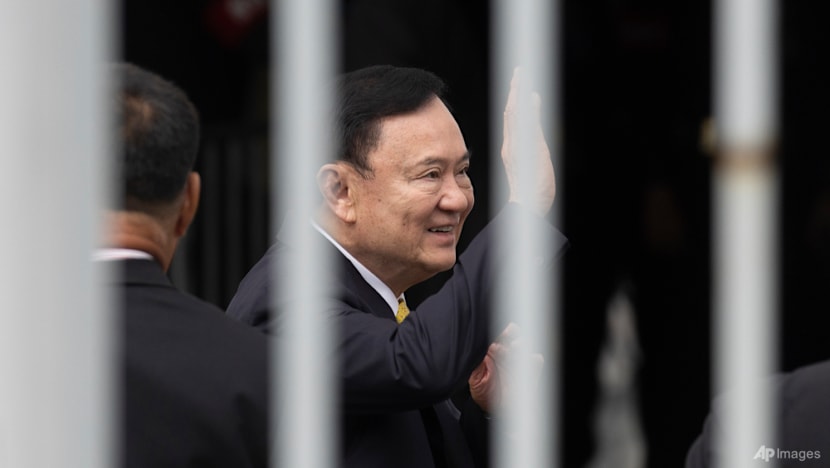Commentary: Thaksin may be in jail, but don't count him out yet
Even with Thaksin Shinawatra behind bars and daughter Paetongtarn ousted, Thailand’s electoral dynamics continue to play to the strengths of political parties like Pheu Thai, says Control Risks’ Harrison Cheng.

Thailand's former Prime Minister Thaksin Shinawatra arrives at Supreme Court in Bangkok, Thailand, Sep 9, 2025. (AP Photo/Wason Wanitchakorn)

This audio is generated by an AI tool.
SINGAPORE: Within barely two weeks, the Pheu Thai party has endured one bitter pill after another. It started on Aug 29 when party chief and then Prime Minister Paetongtarn Shinawatra was removed by the Constitutional Court, followed by the rapid ascension of fierce rival Bhumjaithai Party (BJT) as the head of a new coalition government.
To compound Pheu Thai's misery, the Supreme Court on Tuesday (Sep 9) ordered former leader Thaksin Shinawatra to serve one year in jail, ruling that he had improperly served his sentence for corruption.
Thaksin had received an eight-year sentence in 2023 upon returning to Thailand from self-imposed exile; this was later commuted to one year after a royal pardon. He spent almost all of it in Bangkok’s Police General Hospital due to alleged health issues.
Many observers have since suggested that this string of setbacks sounds the death knell for the influential Shinawatra clan, which has dominated Thai politics since 2001.
Surely the latest blows will sting. But is this really the end of Thaksin's story?
A LOSS FOR PHEU THAI
No doubt Pheu Thai will have to regroup now that their patriarch, who is also the most recognisable face of the party and a brand unto himself, will be behind bars for a while.
It will lose its strongest asset in inter-party diplomacy. Pheu Thai has counted on him to front dicey meetings with other coalition party chiefs to iron out differences before things escalated into open rifts.
For the next 12 months, Pheu Thai figures will have to try and channel their de facto leader's charisma to steer the party back into relevance. They have their work cut out for them, given how quickly former allies deserted them and handed BJT a resounding victory in the Sep 5 parliamentary vote.
That Thaksin is in jail, rather than ensconced in his Dubai villa or family home in Bangkok, also matters immensely. Thaksin will be under greater surveillance than before.
It will be practically harder to orchestrate meetings with other political forces – such as the Progressive Movement led by Thanathorn Juangroongruangkit – to explore ways of political realignment. The Department of Corrections, overseen by the justice ministry under the BJT's control, is unlikely to do him any favours.
And if Mr Anutin honours his pledge to dissolve parliament in four months' time to trigger snap polls in early 2026, Pheu Thai will not be able to rely on Thaksin's star power during campaigning season.
Pheu Thai is undoubtedly in bad shape. Its reputation for economic management, which served it so well in previous electoral outings, is in tatters amid a perfect storm of sluggish demand, lagging tourism and a weakened export outlook. Paetongtarn's naivete vis-a-vis former Cambodian premier Hun Sen, who outmanoeuvred her with the leaked call over the Thai-Cambodian border conflict, has made a mockery of the party's national security credentials.
Thaksin's physical absence in elections in 2011, 2019 and 2023 might have been regrettable for Pheu Thai. In contrast, his absence in the upcoming election could be disastrous.
THAKSIN, A RESILIENT FIGHTER
Lest anyone work themselves up into a frenzy prophesying the great fall of the Shinawatra dynasty, history demonstrates that it would be unwise to underrate Thaksin's resourcefulness in making lemonade out of lemons.
This is not Thaksin's first rodeo. His parties old and new have been put through the wringer: two military coups, three party dissolutions, six prime ministerial oustings, and multiple judicial interventions over two decades. He also endured a six-year interregnum, from 2014 to 2019, in which the architecture of power he built was systematically re-engineered by the military to ensure – it was hoped – that he would never again rule.
And yet. One might quip that Thaksin eats political threats for breakfast.
Some point to Thaksin's 76 years of age and say he is running out of time. But one need only look around Southeast Asia to realise that personalities like Thaksin, with fire in their veins, have a long shelf life.
WAITING FOR THE RIGHT OPPORTUNITY
Thaksin will bide his time, waiting for an opportunity to insert himself into the political equation, which is ever-changing in Thailand. More precisely, he will be waiting to catch a whiff of fear among ruling coalition parliamentarians.
Perhaps Mr Anutin might wonder, ever so slightly, whether fulfilling his pledge to dissolve parliament in four months and initiating a path towards constitutional reform – as demanded by the People’s Party (PP) in exchange for its endorsement – would lead to a major victory for the latter at the polls.
In a PP-dominated parliament, to what extent would Mr Anutin still be the main contender for the prime ministerial post? We might see Thaksin walking out of prison before September 2026 if a partnership with Pheu Thai instead of PP is deemed more favourable.
On the other hand, Thaksin will also watch just how long the PP's faith in Mr Anutin, a staunch royalist, will last. He will likely be there to pick up the pieces if and when that deal falls apart, presenting Pheu Thai as the only “true democratic ally” that the PP needs to advance democratic reforms against the colossal conservative machine.
While Pheu Thai’s grip in the northern and northeastern provinces is not what it used to be, Thailand’s electoral dynamics continue to play to the strengths of political parties like Pheu Thai and the BJT which are reliant on powerful political families (Baan Yai) to deliver votes.
Ideological parties such as the PP have gained a foothold since 2019 but they have a long way to go to become an overwhelming force. The provincial administrative organisation (PAO) elections in February demonstrated as much, with Pheu Thai and the BJT emerging as winners. The PP significantly underperformed, winning only one out of 47 PAO presidential contests.
The BJT’s growing clout in the past year, evidenced by the large faction of BJT-aligned figures in the Senate, is not a sign that Pheu Thai-style patronage politics is finished. In fact, it is very much alive and kicking. Thaksin will take heart from that.
Thaksin will not have the freedom to walk beyond the confines of Klong Prem Central Prison for the next 12 months. But his footsteps will likely continue to echo in the halls of power.
Harrison Cheng is a Director in risk consultancy firm Control Risks.


















